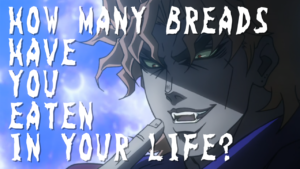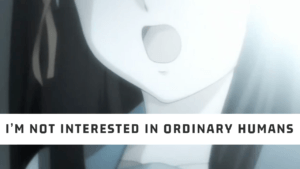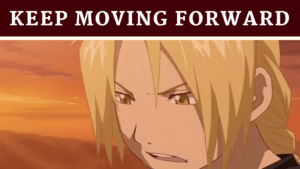Let’s learn Japanese with Naruto’s quote from NARUTO (ナルト).
CONTENTS
Video
Naruto’s Quote
Japanese: まっすぐ自分の言葉は曲げねぇ。それが俺の忍道だ!
Romaji: massugu jibun no kotoba wa magenē. sore ga ore no nindō da!
English: I never go back on my words. That’s my ninja way!
Analysis
まっすぐ自分の言葉は曲げねぇ
まっすぐ (adverb) means “straight”.
自分の言葉 (pronoun + particle + noun) means “my words”.
自分 indicates the speaker Naruto himself and の is the possessive particle so 自分の means “my” and 言葉 means “words”.
は (particle) is the topic particle showing the preceding word is the topic of the sentence.
曲げねぇ (verb) means “not bend”. It’s the contracted form of 曲げない which is the nai-form or negative-form of 曲げる. It’s a transitive verb which requires an object followed by the を particle so “something を曲げる” means “to bend something”. When the object is “one’s belief, opinion, word, will, decision, and so on”, it means “go back on something” or “take something back”.
So 自分の言葉を曲げる means “go back on my words” or “take back my words”. So it’s actually 自分の言葉「を」曲げねぇ but Naruto says 自分の言葉「は」曲げねぇ. を is replaced with は to turn the object into the topic of the sentence. The direct translation would be “as for my words, I won’t take them back”. The meaning is pretty much the same but the object is highlighted by using the は particle.
So まっすぐ自分の言葉は曲げねぇ means “I won’t take back my words”, “I never go back on my words”, or “I keep my words straight”.
それが俺の忍道だ
それ (pronoun) means “it” or “that” indicating the previous statement, so it indicates まっすぐ自分の言葉は曲げねぇ.
が (particle) shows the preceding word is the subject. When it’s used in the sentence like “Noun A が Noun Bだ” it sounds like “nothing else but Noun A is Noun B” so it’s very exclusive.
俺の忍道 (pronoun + particle + noun) means “my ninja way”.
俺 is the first person pronoun usually used by men and の is the possessive particle so 俺の means “my” and 忍道 means “ninja way”. It’s a personal rule that each ninja lives by, their way of living as a ninja, their motto or belief.
だ (auxiliary verb) is used to affirm what the speaker said.
So それが俺の忍道だ means “that is my ninja way”.
Difference between 自分 and 俺
自分 is a reflective pronoun which refers back to a person in the context. It’s often translated as “oneself” for the first, second and third-person pronoun. In this case, the whole original sentence is 俺はまっすぐ自分の言葉を曲げねぇ so 自分 is referring back to 俺 which is Naruto. If he said 俺はまっすぐ俺の言葉を曲げねぇ, it sounds somewhat redundant.
On the other hand, 俺 simply indicates the first-person “I”. The sentence それが俺の忍道だ has nobody to be referred back to so there’s no need to use 自分.
So when there’s somebody to be referred back to, you use 自分, and when there isn’t, you use the first person pronoun. The same rule applies for the second person pronoun and third person pronoun.
Examples
は as the replacement for を
バナナは毎日食べる。
banana wa mainichi taberu.
I eat bananas everyday.
Original: 毎日バナナを食べる。
その映画は先週、映画館で見た。
sono eiga wa senshū, eigakan de mita.
I watched that movie at the cinema last week.
Original: 先週、映画館でその映画を見た。
雑誌は資源ごみの日に捨てたよ。
zasshi wa shigen gomi no hi ni suteta yo.
I threw away the magazines on the recycling collection day.
Original: 資源ごみの日に雑誌を捨てたよ。
A word with the は particle is often something mentioned earlier.
A: 私の雑誌がない! B: 雑誌は資源ごみの日に捨てたよ。
A: watashi no zasshi ga nai! B: zasshi wa shigen gomi no hi ni suteta yo.
A: My magazines are gone! B: As for magazines, I threw them away on the recycling collection day.
俺は逃げねぇ。まっすぐ自分の言葉は曲げねぇ!
ore wa nigenē. massugu jibun no kotoba wa magenē!
I won’t run away. I never go back on my words!
The word “自分の言葉” itself is not mentioned earlier but it indicates his previous words “俺は逃げねぇ”.
A word with the が particle can also be changed into the topic by replacing with the は particle.
A: チョコ好き? B: チョコは(
が)嫌いなんだ。A: choko suki? B: choko wa kirai nanda.
A: Do you like chocolate? B: I don’t like chocolate.
A word with other particles such as に, で, と, から, まで, etc. can also be changed into the topic by adding the は particle.
A: 大阪で何した? B: 大阪ではたこ焼きを食べた。
A: ōsaka de nani shita? B: ōsaka dewa takoyaki o tabeta.
A: What did you in Osaka? B: In Osaka, I ate Takoyaki.
A: 通天閣に行った? B: 通天閣には時間がなくて行けなかった。
A: tsūtenkaku ni itta? B: tsūtenkaku niwa jikan ga nakute ikenakatta.
A: Did you go to Tsūtenkaku? B: I couldn’t go to Tsūtenkaku as I didn’t have time.
Tsūtenkaku is a tower and well-known landmark in Osaka.
〜を曲げる (to go back on/take back something)
父は自分の信念を曲げない。
chichi wa jibun no shinnen o magenai.
My father sticks to his belief.
一度決めた事は絶対曲げない。最後までやり遂げる!
ichido kimeta koto wa zettai magenai. saigo made yaritogeru!
I will never take back what I’ve decided once. I will see it through to the end!
簡単に自分の意見を曲げる人は信用できない。
kantan ni jibun no iken o mageru hito wa shin’yō dekinai.
I can’t trust people who change their opinion easily.
Reflective Pronoun 自分 vs The First-Person Pronoun
自分の家を建てたら、(私の家に)遊びに来てください。
jibun no ie o tatetara, (watashi no ie ni) asobi ni kite kudasai.
If I build a house of my own, please come visit my house.
私の家に can be omitted
自分探しの旅に出ます。(私を)捜さないでください。
jibun sagashi no tabi ni demasu. (watashi o) sagasanaide kudasai.
I will be on a journey of self-discovery. Please don’t look for me.
私を can be omitted
(僕は)自分を愛したい。そして、自分のために生きたい。
(boku wa) jibun o aishitai. soshite jibun no tame ni ikitai.
I want to love myself. And I want to live for myself.
僕は can be omitted
Some people use 自分 as the first-person pronoun (especially by men in a formal situation) or the second-person pronoun (especially in the Kansai region).
自分は山田と申します。
jibun wa yamada to mōshimasu.
My name is Yamada.
申します = more polite than いいます
自分、おもろいな〜!
jibun, omoroi nā!
You are funny!
おもろい = おもしろい in the Kansai dialect
Support Easy Peasy Japanesey
If you enjoy our content, please consider supporting Easy Peasy Japanesey. Your support will help keep us going. Thank you for your support!


